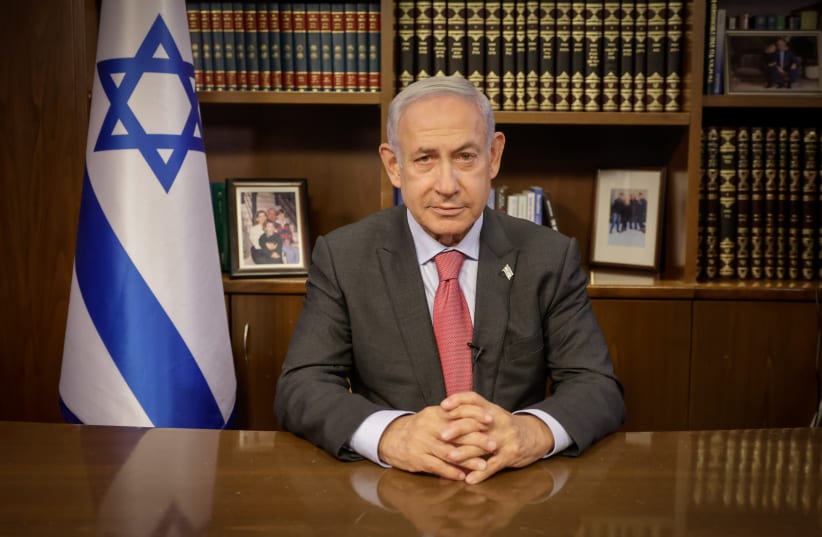Israel needs the Lebanon deal, but northern residents’ concerns must not be dismissed.
By JPOST EDITORIAL NOVEMBER 27, 2024 05:47 Updated: NOVEMBER 27, 2024 05:57 Prime Minister Benjamin Netanyahu in an interview with The Jerusalem Post.
(photo credit: MARC ISRAEL SELLEM/THE JERUSALEM POST)
Prime Minister Benjamin Netanyahu in an interview with The Jerusalem Post.
(photo credit: MARC ISRAEL SELLEM/THE JERUSALEM POST)
“The agreement with Lebanon will maintain Israel’s freedom of operation there to act in defense, remove Hezbollah’s threat, and enable the safe return of northern residents to their homes,” said government spokesman David Mencer on Tuesday, as he outlined the terms of the proposed ceasefire deal with Lebanon.
The 60-day truce, which follows two months of intense fighting, was reached amid mounting pressure from the UN Security Council and the anticipation of a new US administration taking office in January.
The deal allows Israel to attack Hezbollah operatives south of the Litani River and prevent the group’s rearmament, offering an opportunity to regroup and reassess. A senior diplomatic official explained that this pause could also pressure Hamas into negotiating the return of hostages held in Gaza, a key objective for Israel.
However, the agreement has drawn criticism from across the political spectrum. National Security Minister Itamar Ben-Gvir called it “a grave mistake” and accused the government of halting military operations prematurely. “Hezbollah is battered and eager for a ceasefire; we must not stop,” he said.
Finance Minister Bezalel Smotrich was more blunt, stating, “No agreement. If signed, it will be worth the paper it’s written on.”
The northern residents themselves remain displaced, and the government has not called for their return. While stipends continue to support those evacuated, the uncertainty surrounding their homes and futures weighs heavily. Likud MK Dan Illouz expressed their fears, warning that the agreement relies on international monitoring mechanisms that have “proven weak and ineffective in the past.”
This criticism, while pointed, cannot overshadow the fact that Israel needed to act. The situation demanded a careful balance between immediate military needs and broader strategic objectives.
The truce allows Israel to recalibrate, ensuring its readiness for potential future escalations. It also signals to the international community that Israel is willing to exercise restraint, a crucial factor in maintaining diplomatic support.
Still, for the residents of the North, this deal feels too familiar. They have seen agreements like this before, only to watch Hezbollah grow stronger.
Understandable mistrust
Their mistrust is understandable. Northern residents are not just statistics in this conflict; they are families forced to abandon their homes, children growing up with air raid sirens as a backdrop, and communities grappling with the emotional and financial toll of prolonged displacement.
Stay updated with the latest news!
Subscribe to The Jerusalem Post Newsletter
To ask them to trust in another diplomatic promise requires more than words. It requires tangible action and unwavering commitment to their security.
Simultaneously, the critics who demand a complete dismantling of Hezbollah must grapple with the realities of the moment. Israel is already engaged in an intensive war against Hamas in Gaza. Fighting on two fronts indefinitely is neither sustainable nor strategic.
The deal, while imperfect, offers breathing room. It provides an opportunity to address broader threats without overextending Israel’s military and political resources.
Israel’s challenge is to prove that this agreement is not another hollow promise.
Clear communication
The government must communicate clearly and transparently with the public, particularly the northern residents, about the measures to secure their safety. Regular updates, visible preparations for potential future conflict, and a steadfast refusal to compromise on critical security provisions are essential.
Israelis, particularly those in the North, have every right to voice their doubts and demand accountability. Their voices must be heard, not dismissed as inconvenient dissent.
This agreement is a gamble, but so is war. The truce provides a chance to recalibrate, pressure Hamas, and secure international support – all crucial in the long term. Israel needs this deal, but it also needs to remember that the northern residents are not collateral damage in a grand strategy. They are the nation’s heart, and their safety must remain the ultimate priority.
Trust in diplomacy is earned, not assumed. If this agreement is to be more than a pause in the storm, it must lead to real, lasting security for those who have paid the heaviest price. Only then can the northern residents and the rest of the country begin to move forward with hope rather than fear.

 By The Jerusalem Post (World News) | Created at 2024-11-27 04:00:08 | Updated at 2024-11-27 06:36:54
2 hours ago
By The Jerusalem Post (World News) | Created at 2024-11-27 04:00:08 | Updated at 2024-11-27 06:36:54
2 hours ago








